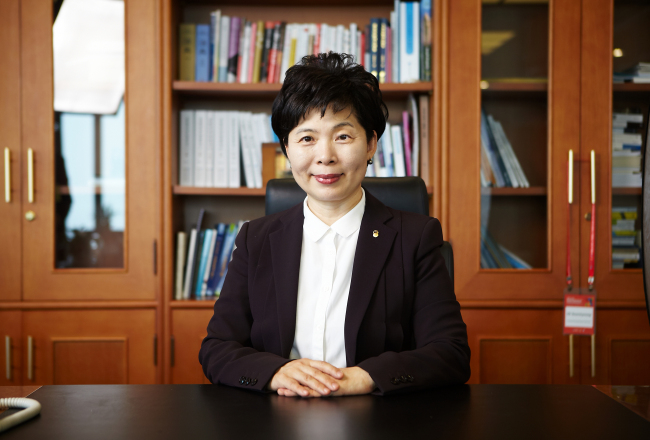This is the fourth in a monthly series contributed by executive members of the Financial Supervisory Service to address key ongoing financial issues. ― Ed.

It was one of the hottest days this summer when a group of employees at the Financial Supervisory Service visited the rural village Seondang in Chungju, a city of North Chungcheong Province, and shed a bucket of sweat in helping harvest fully ripe peaches and corn. This recent event took place to celebrate the partnership that the FSS and Seondang had enjoyed for 10 years, in accordance with the corporate-rural village sisterhood project.
Similarly, the FSS decided to launch a new educational project together with financial companies on June 9 as part of the “20 Reform Tasks” it had announced. The so-called corporate-school education project is designed to link each headquarters or branch office of financial companies all across the nation with a nearby elementary or middle school in the form of sisterhood to ensure practical financial education for young Koreans. A participating company is expected to dispatch an employee to its sister school or invite students over to its branch office for hands-on learning and other educational activities.
“While illiteracy makes one’s life uncomfortable, financial illiteracy makes one’s survival impossible,” said Alan Greenspan, former Chairman of the Federal Reserve Board. As his remarks indicate, financial literacy has become an essential life skill in a modern society. With this in mind, the FSS and many financial companies have been taking various approaches to help widen financial knowledge of young students. Nevertheless, only a tenth of them in Korea have received financial education so far. Under this circumstance, the FSS is launching the new project to ensure that students can develop financial literacy in a more systematic way.
First of all, this project is focused on practical education. According to a financial literacy survey conducted last year, Koreans scored high in financial knowledge with 75.6, but their scores in financial behavior and attitude turned out low with 59.0 and 61.0, respectively. This shows that there is clearly a need for financial education in Korea aimed at nurturing good habits and attitude to lead a healthy financial life. It is desirable to expand practical learning focused on real-life financial case studies and experiences with the help of a financial expert working in the field.
Also, this project is intended to promote financial literacy education at an early age. Financial habits such as saving money and managing credit are best developed through systematic education in childhood. For this reason, advanced countries are strengthening their early financial education programs. The United States has 17 states where finance is a mandatory subject in high school curriculum, while the United Kingdom requires youngsters under the age of 17 to receive financial education. The new project targeting elementary and middle school students will prove to be a good way of developing financial literacy of Korean people from early on.
This is designed to be a continued educational service for schools all across the nation. The project where a financial branch office engages in teaching students in the neighborhood will benefit relatively disadvantaged rural schools with greater access to financial education. Indeed, many of the schools that so far have applied for this project are located in rural areas, indicating that young Koreans are expected to enjoy more equitable educational opportunities thanks to this new endeavor.
The FSS is now receiving applications from schools and financial companies ― aiming to implement the project this September ― and explained the details to teachers from all across the nation through presentations in July. To make this project well-received, the FSS will create educational programs that are both interesting and useful in everyday life, while helping financial instructors to build their teaching skills.
The success of the project very much depends on voluntary participation from financial companies. When they lend their helping hand as a way to give back to the communities, the new project will shine more brightly. A keen interest from both schools and financial companies will certainly make this project successful and thus bring Korea one step closer to its goal of becoming a financial powerhouse.
By Oh Soon-myoung
The writer is the chief of consumer protection bureau at the Financial Supervisory Service. The views reflected in the article are her own. She can be reached at sm5@fss.or.kr ― Ed.
-
Articles by Korea Herald



![[AtoZ into Korean mind] Humor in Korea: Navigating the line between what's funny and not](http://res.heraldm.com/phpwas/restmb_idxmake.php?idx=644&simg=/content/image/2024/04/22/20240422050642_0.jpg&u=)


![[Exclusive] Korean military set to ban iPhones over 'security' concerns](http://res.heraldm.com/phpwas/restmb_idxmake.php?idx=644&simg=/content/image/2024/04/23/20240423050599_0.jpg&u=20240423183955)
![[Herald Interview] Why Toss invited hackers to penetrate its system](http://res.heraldm.com/phpwas/restmb_idxmake.php?idx=644&simg=/content/image/2024/04/22/20240422050569_0.jpg&u=20240422150649)
![[Graphic News] 77% of young Koreans still financially dependent](http://res.heraldm.com/phpwas/restmb_idxmake.php?idx=644&simg=/content/image/2024/04/22/20240422050762_0.gif&u=)







![[Exclusive] Korean military to ban iPhones over security issues](http://res.heraldm.com/phpwas/restmb_idxmake.php?idx=652&simg=/content/image/2024/04/23/20240423050599_0.jpg&u=20240423183955)



![[Today’s K-pop] Ateez confirms US tour details](http://res.heraldm.com/phpwas/restmb_idxmake.php?idx=642&simg=/content/image/2024/04/23/20240423050700_0.jpg&u=)